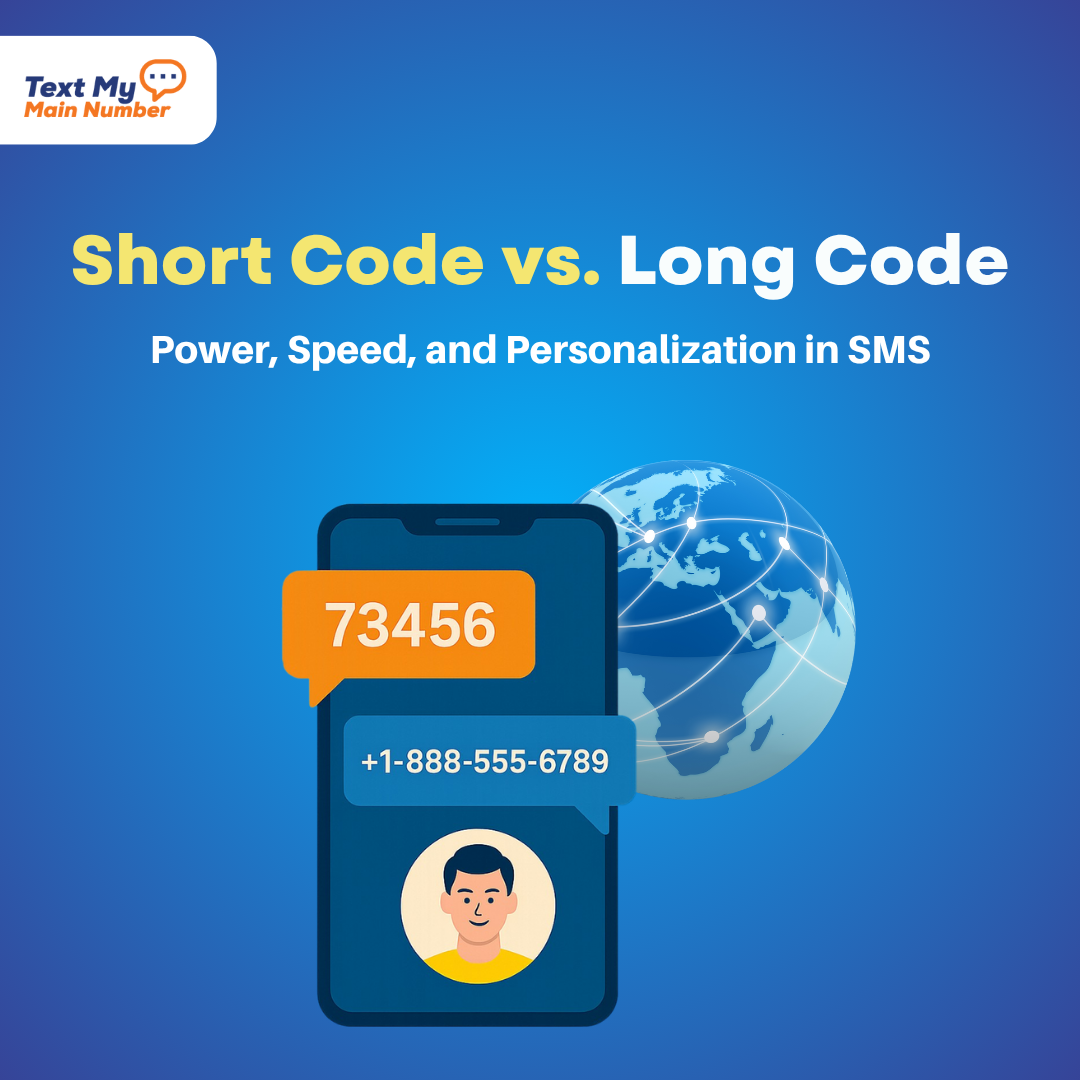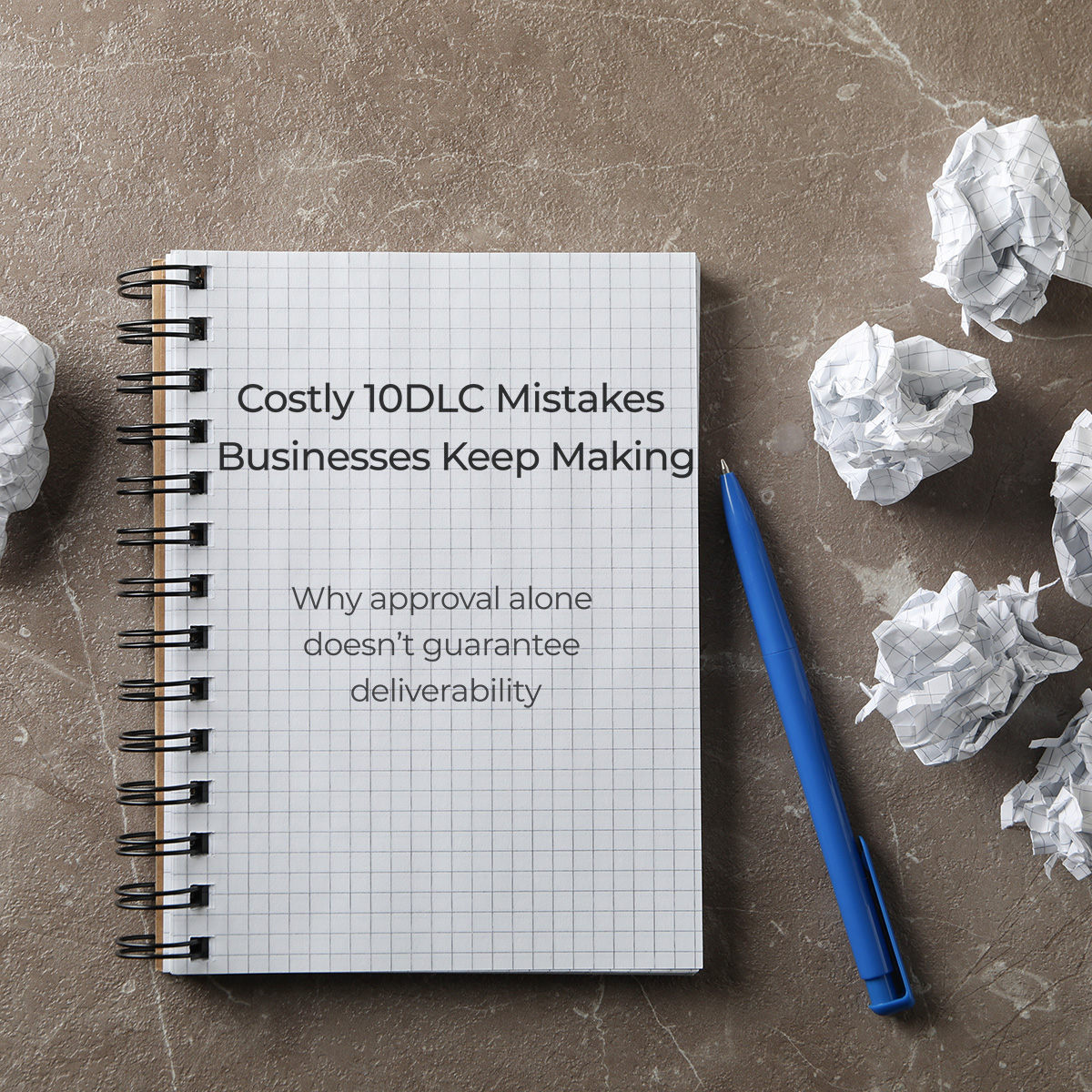SMS Compliance | Your TCPA Text Message Compliance Checklist for 2025
Disclaimer: This article is intended for informational purposes only and does not constitute legal advice. We strongly recommend consulting with your legal team to ensure full compliance with federal and state mobile marketing laws.
With SMS boasting a 98% open rate, it’s no wonder businesses are doubling down on text-based communication. But in the excitement of launching campaigns and scaling outreach, one critical element is often overlooked: compliance.
The Telephone Consumer Protection Act (TCPA) was enacted by the FCC in 1991 to protect consumers from unsolicited and intrusive communications. That includes marketing text messages, which fall under the same strict regulations as robocalls and faxes. If your business is sending messages without following TCPA rules, you could face serious consequences—including lawsuits, government fines, and irreparable damage to your brand’s reputation.
What’s at Stake?
- Financial Penalties: Each non-compliant message can cost your business between $500 and $1,500. Multiply that across a campaign, and the fines can escalate quickly.
- Brand Trust: Consumers are increasingly aware of their digital rights. Demonstrating respect for their privacy by complying with TCPA regulations builds lasting trust and loyalty.
What Does TCPA Compliance Require?
Here’s a simplified breakdown of the core requirements:
- Clear, Express Written Consent: Before sending any promotional SMS, you must have explicit permission from the recipient. Verbal or implied consent does not suffice under TCPA.
- Transparent Disclosures: Inform users about the types of messages they’ll receive and how often. This must happen before they opt-in.
- Easy Opt-Out Options: Every message must include clear instructions on how to unsubscribe (e.g., “Reply STOP to opt-out”).
These rules aren’t suggestions—they’re the legal foundation of every ethical and sustainable SMS strategy.
Did You Know? Consumers can report violations, revoke consent at any time, or even file lawsuits against non-compliant businesses. The Do Not Call Registry also applies to SMS marketing and violating it can trigger additional penalties.
What Happens If You Don’t Comply?
Non-compliance doesn’t just result in fines—it can open the door to class-action lawsuits that cost millions and inflict lasting brand damage. Major retailers and service providers have learned this the hard way. Your best defense? A bulletproof compliance process that starts with understanding the TCPA’s full scope.
Explore how TMMN helps businesses avoid legal pitfalls and deliver impactful, privacy-first messaging with our guide: Avoid Costly SMS Compliance Risks – Ensure Secure Business Messaging with Age Verification & 10DLC.
What Is TCPA?
The Telephone Consumer Protection Act (TCPA) is a federal law passed in 1991 to safeguard consumers from unwanted and intrusive communications via phone calls, faxes, and—most importantly for today’s businesses—text messages.
Administered by the Federal Communications Commission (FCC), the TCPA establishes legal requirements that all businesses must follow when using automated technologies to contact consumers. This includes tools like SMS platforms, auto-dialers, and prerecorded voice systems.
Why It Matters for SMS Marketing
The TCPA wasn’t originally designed with texting in mind, but as mobile communication evolved, courts and regulators expanded its scope to include text message marketing. That means if you’re sending promotional texts—no matter how relevant or well-intended—they must comply with TCPA rules.
Why TCPA Compliance Is Essential for Shopify and eCommerce Brands
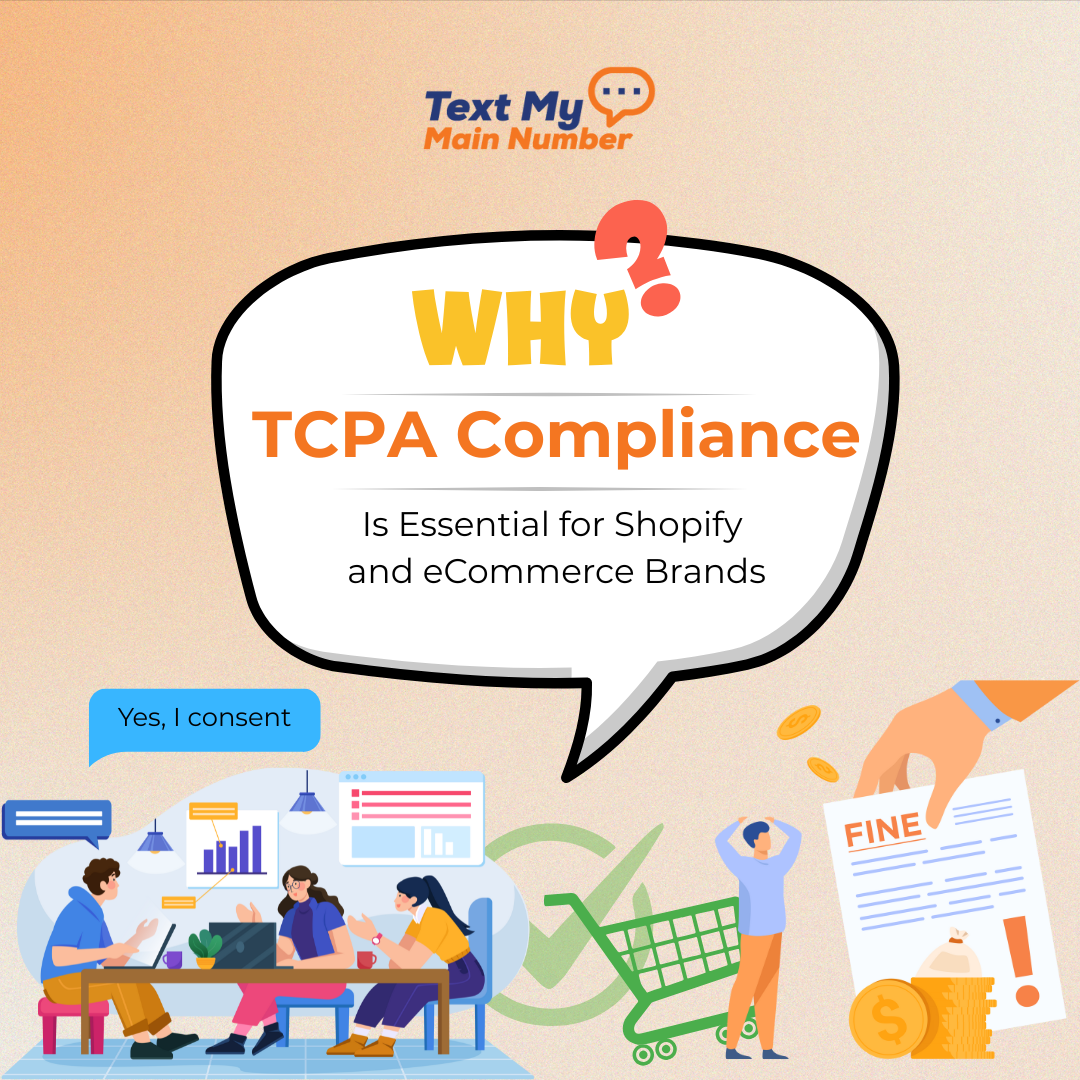
For fast-growing eCommerce and Shopify brands, SMS marketing is one of the most effective ways to drive engagement and sales—but only if it's built on trust and legal compliance. Following TCPA (Telephone Consumer Protection Act) guidelines isn’t just about avoiding penalties; it’s about protecting your business, enhancing customer relationships, and creating a scalable, ethical foundation for long-term growth.
1. Avoiding Legal Risks and Financial Penalties
The legal consequences of non-compliance are steep—and avoidable.
- Hefty Fines: The TCPA allows fines ranging from $500 to $1,500 per message sent without proper consent. For high-volume campaigns, even minor oversights can result in six-figure settlements.
- Class-Action Lawsuits: Consumers can band together and take legal action. Many well-known brands have paid millions in class-action settlements due to improper SMS practices.
2. Building Trust and Driving Higher Engagement
In today’s privacy-aware landscape, consumer trust is everything—and compliance helps you earn it.
- Clear Consent Builds Confidence: When customers know exactly what they’re signing up for, they’re more likely to engage with your texts.
- Respect for Privacy Increases Loyalty: TCPA compliance assures customers that their data and preferences are being respected.
3. Enhancing Brand Reputation and Market Position
Compliance isn’t just a legal requirement—it’s a brand statement.
- Positioning: Respecting regulations signals that your brand is responsible, forward-thinking, and customer-centric.
- Perception: Consumers are increasingly choosing brands that protect their privacy and avoid invasive marketing.
- Prevention: By avoiding negative publicity, lawsuits, and public backlash, your brand stays focused on what matters—growth.
Bonus: 3 Quick Reasons to Stay Compliant
- Deliverability & Performance
Mobile carriers are cracking down on non-compliant messages. Following TCPA standards helps your texts reach inboxes—not spam folders. - Trustworthy Brand Image
Obtaining opt-in and honoring opt-outs shows you're a brand that respects boundaries. That’s a competitive advantage. - Protection from Class Actions
One violation might not seem critical, but 1,000 unauthorized texts could cost your business over $1.5 million in legal damages.
New to SMS? Learn the fundamentals in our Ultimate Beginner’s Guide to SMS Marketing before diving into compliance.
The TCPA Compliance Checklist for SMS Campaigns
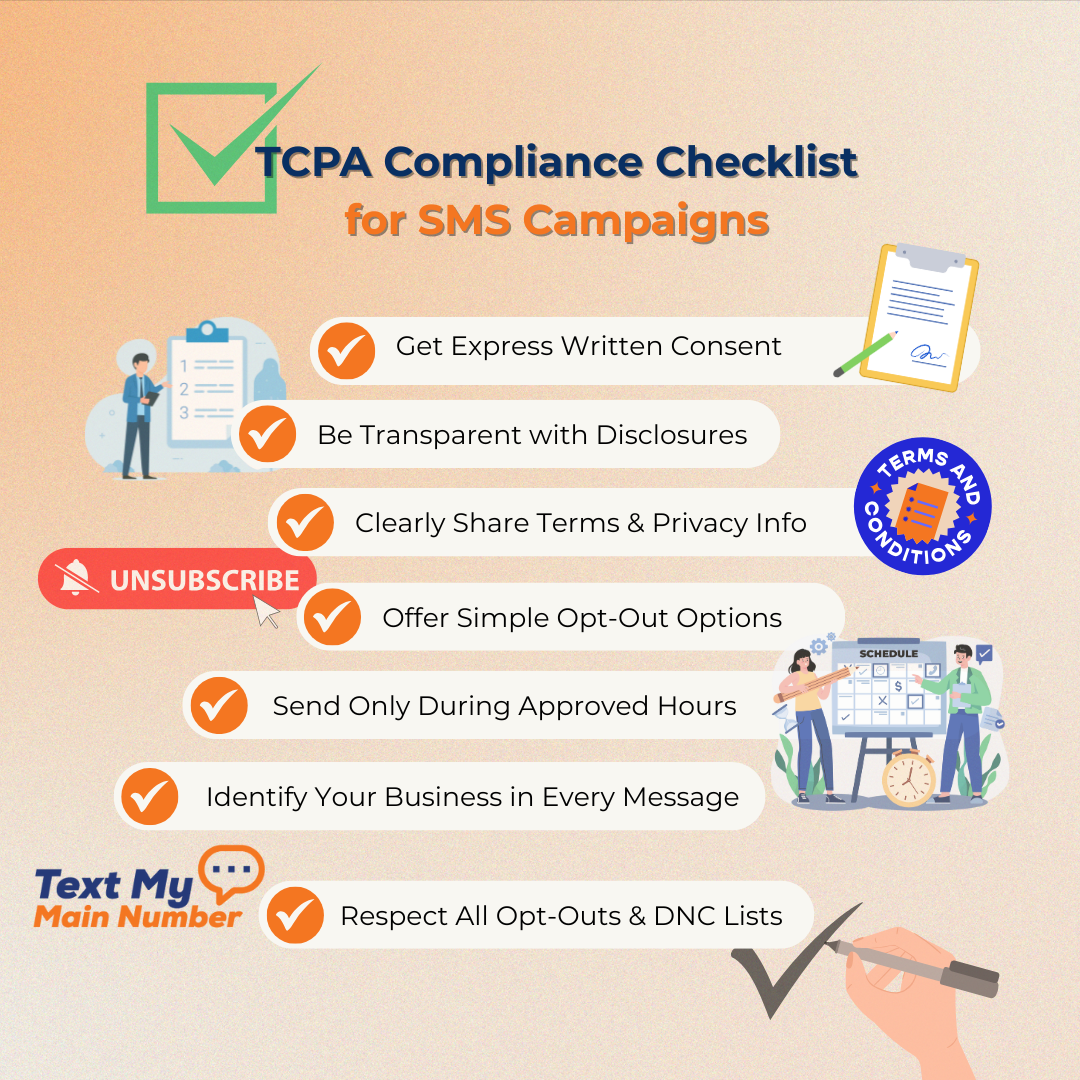
Staying TCPA-compliant isn’t just about avoiding fines—it’s about building trust, safeguarding your reputation, and maintaining a legally sound SMS marketing strategy. At Text My Main Number (TMMN), we’re committed to helping businesses stay compliant while maximizing the benefits of SMS communication. Below is your step-by-step compliance checklist.
1. Obtain Express Written Consent
At the heart of TCPA compliance is clear, documented, and explicit customer consent. This isn’t optional—it’s required before sending any marketing SMS.
Acceptable Consent Methods:
- Opt-in Checkboxes at Checkout: Customers must manually check the box—no pre-checked boxes allowed.
- SMS Keyword Opt-ins: Invite customers to text a keyword (like “JOIN”) to subscribe.
- Form Submissions: Include a clear message stating that by submitting their number, they agree to receive marketing texts.
Sample Consent Language:
"By checking this box, you agree to receive promotional messages from [Your Business Name]. Message frequency may vary. Message and data rates may apply. Reply STOP to unsubscribe."
TMMN Tip: Always store timestamped records of opt-ins to defend against disputes.
2. Provide Clear Disclosures
Transparency fosters trust and protects your business.
Disclosures Must Include:
- Your business name
- Purpose of your messages (e.g., offers, updates, alerts)
- Frequency of texts (e.g., "up to 4 messages/month")
- Opt-out instructions (e.g., “Reply STOP to unsubscribe”)
- Link to full terms and conditions and privacy policy
Include this disclosure in your first message and periodically afterward.
3. Clearly Communicate Terms and Conditions
Make sure your subscribers know where to find the full terms.
- Include a link to your Terms and Conditions in the opt-in message.
- Periodically remind users how to access them.
- Notify users if your policies change.
Example Message:
"[Brand] Alerts: Get exclusive offers and updates. Approx 6 msgs/month. Msg & data rates may apply. Reply STOP to opt out. Terms: [link]"
4. Set Easy Opt-Out Instructions
Each SMS must include a simple and immediate opt-out option.
Standard Opt-Out Phrase:
"Reply STOP to unsubscribe."
Best practices include:
- Automating opt-out removal
- Sending a confirmation message after opt-out
TMMN Tip: TMMN automates opt-out management so customers are instantly removed from your SMS list.
5. Send Messages Only During Approved Hours
Avoid sending messages outside legal hours to prevent privacy violations.
Permitted Hours:
Between 8:00 AM and 9:00 PM local time the recipient
Pro Tip: Use automated scheduling (available through TMMN) to align messages with local time zones.
6. Include Your Business Name in All Messages
Every message must clearly identify who it’s from. This avoids confusion and helps maintain brand trust.
Example:
"[Your Business Name]: Flash Sale starts now! 20% off all items. Reply STOP to opt out."
7. Respect the Do Not Call Registry & Opt-Outs
It’s illegal to contact individuals listed on the National Do Not Call Registry.
In addition:
- Maintain your own Do Not Contact list internally.
- Honor all opt-out requests immediately.
Consider sending a final confirmation message after opt-out to reassure users.
Bonus Compliance Reminders
Here’s a summarized checklist to keep near your marketing dashboard:
- Use a TCPA-compliant SMS platform like TMMN
- Register with A2P 10DLC to become a verified sender
- Publish your SMS policy on your website
- Avoid messages that violate CTIA SHAFT guidelines (Sex, Hate, Alcohol, Firearms, Tobacco)
- Maintain and respect an internal DNC (Do Not Contact) list
- Stay within time-of-day restrictions
TCPA Exceptions: Which Messages Don’t Require Consent?
Remember: TCPA compliance is not a one-and-done effort—it’s an ongoing commitment. By embedding these practices into your SMS workflows, you protect your brand from legal risks while building deeper, trust-based relationships with your customers.
While most SMS marketing messages require express written consent, not all text messages fall under the same regulatory lens. Certain transactional or informational messages are exempt from TCPA consent rules—if they’re sent properly and remain strictly non-promotional.
What Are Transactional Messages?
Transactional messages are communications that relay essential, non-promotional information related to a customer’s account, order, or service. These messages are exempt from TCPA's consent requirements because their purpose is to inform—not to advertise.
Examples of TCPA-exempt transactional messages include:
- Order Confirmations – “Thanks for your order! Your receipt is attached.”
- Shipping Updates – “Your package has shipped and will arrive Thursday.”
- Security Alerts – “Suspicious login detected. Was this you?”
Best Practice: Even if consent isn’t required, these messages should still be relevant, brief, and free of marketing language. Adding a promo like “Get 10% off your next order” could instantly reclassify your message as marketing—and trigger TCPA enforcement.
Why This Matters for Shopify and eCommerce Brands
While transactional messages are critical for operational updates, most texts sent by Shopify and eCommerce platforms are promotional in nature—and must follow TCPA compliance rules.
Promotional Content Defined
Any message that contains:
- Discounts or offers
- Product recommendations
- Flash sales or upsells
— is considered marketing, regardless of context.
Even hybrid messages like:
“Your order has shipped! Get 10% off your next purchase with code THANKYOU10”
can shift a message into the regulated category requiring full TCPA compliance.
Pro Tip: Separate Message Types to Stay Compliant
To avoid confusion and risk:
- Use separate systems or workflows for transactional vs. promotional texts.
- Avoid blending operational messages with sales offers.
- Ensure only promotional messages are subject to opt-in and opt-out protocols.
Other TCPA Exceptions to Know
Some industries and emergency communications are also exempt from standard TCPA consent rules:
- Financial Institutions – Account balances, fraud alerts
- Healthcare Providers – Appointment reminders, lab results
- Pharmacies – Prescription ready notifications
- Utility Companies – Outage or restoration updates
- Schools – Emergency alerts, closures, health notifications
These exceptions apply only to non-commercial content. Any message that sells, promotes, or markets still requires full TCPA compliance.
Best Practices for TCPA Compliance in SMS Marketing
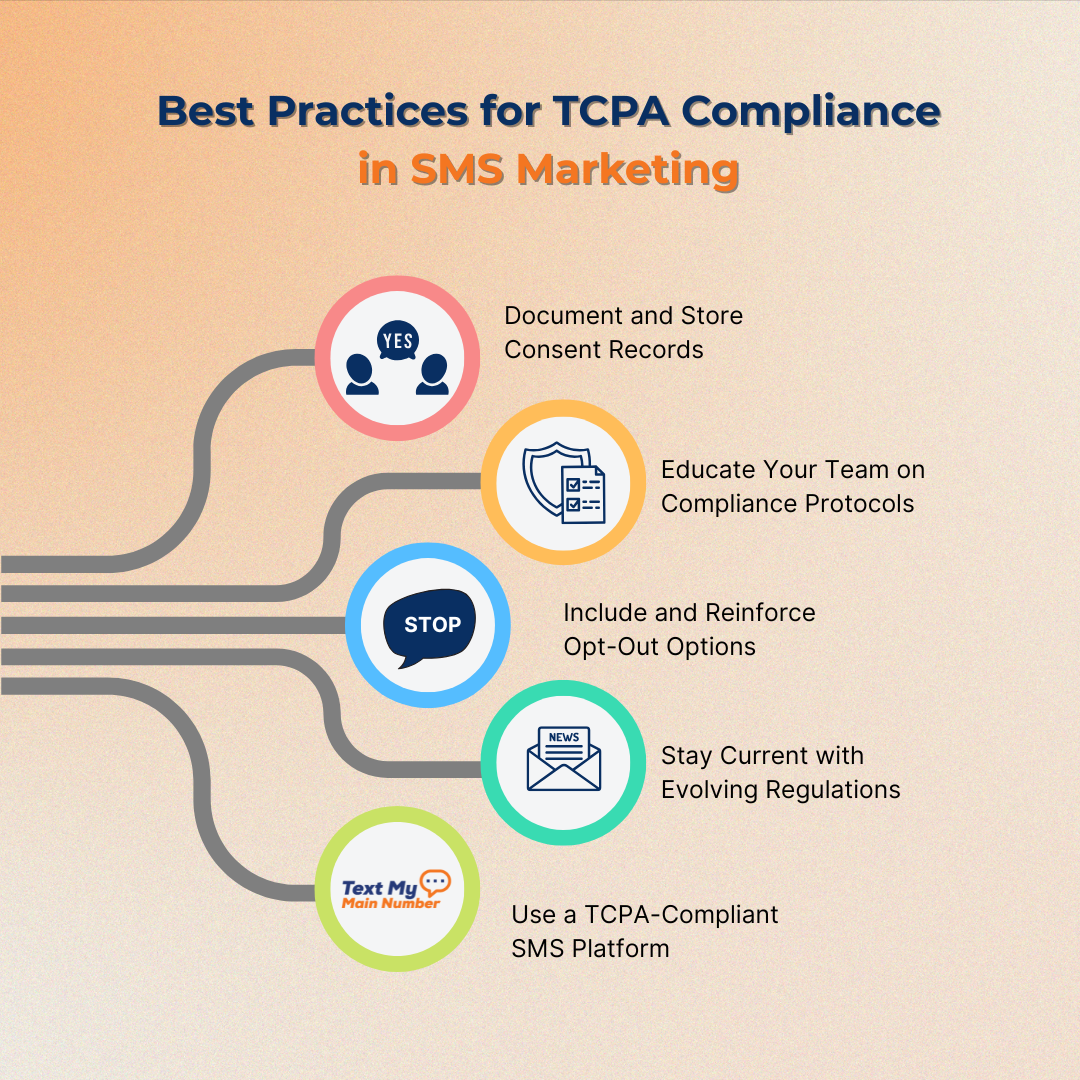
TCPA compliance is more than a legal requirement—it’s a strategic pillar of trustworthy, effective SMS marketing. For Shopify brands and eCommerce marketers, staying compliant not only prevents costly penalties but also builds a long-term foundation of customer trust and brand integrity.
Below are essential best practices that every business should implement to confidently run compliant and customer-centric SMS campaigns.
1. Document and Store Consent Records
Before you send a single marketing message, make sure you have documented express written consent. It’s your legal shield.
Why It Matters:
In the event of an audit or legal dispute, proof of consent could be your only defense against thousands—or even millions—of dollars in TCPA fines.
How to Do It Right:
- Log the date and time each customer opted in.
- Track the method of consent (e.g., form checkbox, SMS keyword).
- Archive the exact language shown at opt-in.
Pro Tip:
Use tools like TMMN to automate consent tracking and safely store records in one centralized dashboard.
2. Educate Your Team on Compliance Protocols
Compliance isn’t the responsibility of one person—it’s a shared duty. Everyone involved in your SMS marketing efforts must understand and follow TCPA rules.
Make It a Team Priority:
- Develop a company-wide SMS compliance policy and add it to your employee handbook.
- Designate a compliance officer or lead to oversee message approvals.
- Conduct quarterly training sessions to keep staff aligned with the latest laws and best practices.
Why It Works:
An informed team minimizes risk and ensures your brand communicates with clarity, consent, and care.
3. Include and Reinforce Opt-Out Options
Every message must give customers a clear way to opt-out. But great brands go further—offering regular opt-out reminders to ensure customers feel in control.
Compliance Meets Customer Experience:
- Use the standard: “Reply STOP to unsubscribe.”
- Send a reminder after a few messages or monthly, especially in high-frequency campaigns.
- Automate opt-outs using compliant platforms to instantly honor requests.
Respecting boundaries shows respect for your audience—and that respect fosters loyalty.
4. Stay Current with Evolving Regulations
Laws change. So should your strategy. Beyond federal TCPA rules, states like California (CCPA) and Florida (FTSA) have introduced new SMS-related legislation.
How to Stay Informed:
- Subscribe to trusted compliance newsletters.
- Partner with legal advisors for regular updates.
- Choose SMS providers like TMMN that monitor and adjust for changes automatically.
Remaining proactive ensures you’re not caught off guard when new regulations roll out.
5. Use a TCPA-Compliant SMS Platform
Invest in tools that make compliance automatic. Platforms like TEXT MY MAIN NUMBER are purpose-built to help eCommerce brands follow TCPA rules without slowing down growth.
Key Features to Look For:
- Automated consent tracking and audit trails
- Quiet-hour enforcement (8 AM–9 PM local time)
- Instant opt-out processing
- 10DLC registration support for verified messaging
By embedding compliance into your tech stack, you reduce manual errors and gain peace of mind.
Real-World Reminders: The Cost of Non-Compliance
TCPA violations can escalate fast—and high-profile lawsuits show just how steep the consequences can be:
- Capital One (2014): Paid $75.5 million for using autodialers without consent.
- Steve Madden (2013): Fined $10 million after sending 200,000+ texts via a third party.
- Pizza Hut Franchises (2022): Settled for $6 million over 13,000 non-compliant texts.
The lesson is simple: short-term shortcuts can lead to long-term legal damage.
Ready to Send Texts That Are Trusted, Legal, and High-Converting?
Staying TCPA-compliant isn’t just about ticking legal boxes—it’s about building a brand that respects customer boundaries, communicates with purpose, and drives measurable results. With Text My Main Number, you gain more than a messaging platform—you gain a compliance partner that simplifies legal requirements and enhances your customer experience.
From automated consent tracking and quiet-hour messaging to 2-way conversations that recover lost sales, TMMN equips your Shopify or eCommerce brand with the tools to grow ethically and effectively.
Start your 14-Day Free Trial Now—no contracts, no risk, just results.
- Compliant out of the box with consent and opt-out automation
- Flexible pricing for businesses at every growth stage
- Expert support and tailored strategy sessions
Need help getting started?
Book a free call with our Customer support experts and receive a customized compliance and conversion plan.
TCPA Compliance FAQs for SMS Messaging with TextMyMainNumber
Whether you're just starting out or scaling your business communication, understanding SMS compliance is essential. Below are answers to the most frequently asked questions about TCPA regulations—customized for TMMN users.
1. What compliance laws regulate SMS marketing in the U.S.?
Business texting is governed by three main regulatory bodies and frameworks:
- TCPA (Telephone Consumer Protection Act)
- FCC (Federal Communications Commission)
- CTIA (Cellular Telecommunications and Internet Association)
These regulations ensure that businesses obtain clear consent, honor opt-out requests, and protect consumer privacy. When using TMMN’s SMS services, you align your outreach with the strictest legal safeguards.
2. Are there other laws beyond the TCPA I should know about?
Yes. Several U.S. states have added their own privacy protections:
- Florida’s Telephone Solicitation Act (FTSA) limits message volume and restricts outreach after 8 PM.
- California’s Consumer Privacy Act (CCPA) applies even to some manual messages and requires opt-in consent for most SMS marketing.
TMMN stays ahead of these changes, helping your business remain compliant across both federal and state-specific laws.
3. What is A2P 10DLC and how does it affect my texting?
A2P 10DLC (Application-to-Person 10-Digit Long Code) is the sanctioned messaging route for businesses in the U.S. It requires brand registration and helps carriers:
- Approve your campaigns
- Deliver your messages reliably
- Reduce spam and filter fraud
TMMN facilitates A2P 10DLC registration so your texts land safely in inboxes—and stay compliant.
4. What recent changes to TCPA should I know about?
As of late 2023, the FCC enforced stricter consent standards:
- Businesses must now acquire one-to-one consent—banning broad opt-ins shared across multiple affiliates or brands.
- Blanket “partner marketing” clauses no longer count.
At TMMN, we help you ensure your opt-ins are auditable, specific, and fully compliant with these new rules.
5. Does the TCPA apply to SMS?
Yes. The FCC's 2015 ruling confirmed that text messages are subject to TCPA regulations, just like phone calls. That means:
- No unsolicited promotional messages without written consent
- No texts during prohibited hours (before 8 AM or after 9 PM local time)
TMMN’s quiet-hour scheduling and opt-in automation keep you on the right side of the law.
6. Do TCPA rules apply only to consumers?
No. While the TCPA is designed to protect consumers, business mobile numbers can also be covered—especially when used for personal or mixed-use. It's safest to treat all recipients as protected under TCPA standards.
7. Are there any exceptions to the TCPA?
Yes. Some transactional and non-commercial messages are exempt from TCPA’s consent requirements, such as:
- Order confirmations
- Shipping updates
- Appointment reminders
- Emergency alerts from schools, healthcare providers, or utility companies
However, any message with a promotional element—like a discount—requires consent. TMMN helps you separate transactional from marketing content to avoid violations.
8. What is the FCC’s role in SMS regulation?
The Federal Communications Commission (FCC) enforces the TCPA. Its responsibilities include:
- Setting consent requirements
- Enforcing opt-out rules
- Investigating complaints and issuing fines
TMMN follows FCC guidance to help ensure your text campaigns meet all compliance standards.
9. What does the CTIA do?
The CTIA is the telecom industry’s watchdog. While not a government body, it:
- Establishes messaging standards
- Monitors content compliance (e.g., avoiding SHAFT violations: Sex, Hate, Alcohol, Firearms, Tobacco)
- Works with carriers to block spam and preserve trust in SMS
TMMN keeps your campaigns aligned with CTIA expectations to safeguard deliverability.
10. What is a DNC list, and can I text numbers on it?
DNC stands for Do Not Contact. Numbers on the National Do Not Call Registry must not be texted unless you have prior express consent.
TMMN enables automated opt-out handling and supports internal suppression lists to help you respect all DNC boundaries.
11. Is mass texting illegal?
Mass texting is legal, but only if you follow proper compliance procedures. That includes:
- Registering with A2P 10DLC
- Gaining written consent
- Including opt-out language in every message
TMMN’s messaging platform is optimized for compliant bulk texting that’s secure and scalable.
12. What are the penalties for violating TCPA rules?
Violations can be costly:
- Up to $500 per unsolicited text
- Up to $1,500 per willful violation
- Class-action lawsuits that can reach millions in damages
With TMMN, you mitigate this risk by using our automated consent tools, quiet-hour enforcement, and real-time opt-out features.
13. Who enforces TCPA rules in the U.S.?
TCPA enforcement is a collaborative effort:
- Congress creates the law
- The FCC interprets and enforces it
- Courts rule on individual and class-action cases
- The FTC (Federal Trade Commission) assists with marketing regulation
TMMN stays updated with these regulatory bodies so your SMS outreach always stays compliant.




.svg)
